**This post may contain affiliate links. If you make a purchase using the links in this article, I might earn a commission at no extra cost to you. Please see my full disclosure for further information.

Planning a trip to Greece can get very overwhelming rather quickly. With so many things to decide, hundreds of logistical questions can pour in quite vigorously. Like what’s the best way to get around the islands and how much time should you be calculating for travel time? How much money are you going to need – can Greece even be done on a budget? And what should you be packing?!!
Don’t panic! I’ve done the work for you and have compiled this list of tips that will help you plan a worry-free and flawless vacation. From things to watch out for, to what you should or should NOT be doing, I guarantee these 18 practical tips will help you live out your dream trip to Greece without a glitch.
Post Contents
Planning A Trip to Greece – 18 Helpful Tips
How Many Days in Greece?
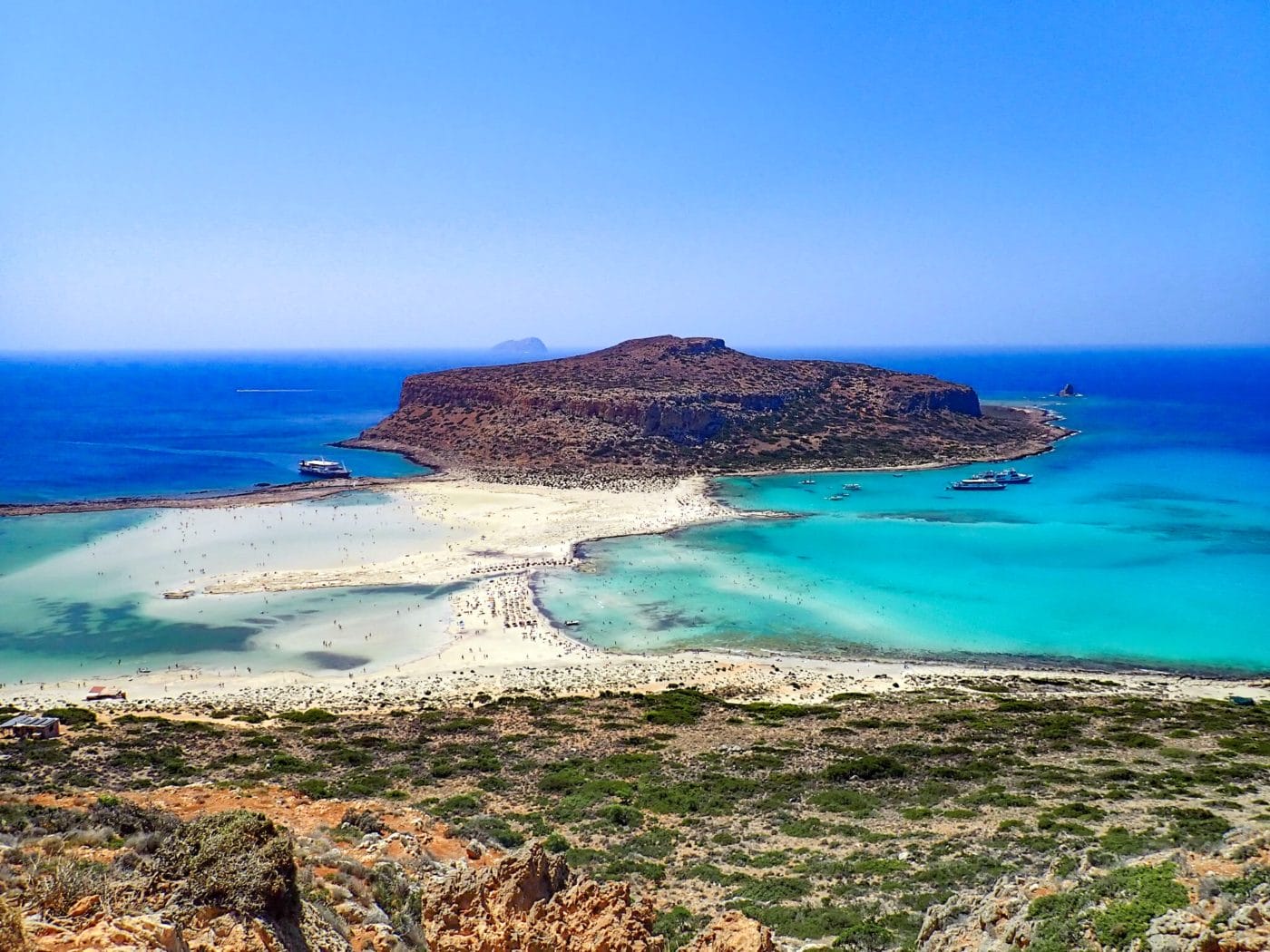
So, first item on the agenda while planning a trip to Greece is figuring out exactly how many days to stay. Depending on what type of trip you’re going for you might need more or less time.
Are you looking to just hit Athens and maybe a couple other areas on the mainland or are you looking to do some island hopping around the Greek Islands?
1. You need AT LEAST 10 days in Greece if you’re planning to island hop
Assuming a classic itinerary of several days in Athens with the rest dedicated to a couple of the Greek Islands, I wouldn’t suggest anything less than 10 days. Remember that when island hopping, you need to take into consideration travel time between the islands. Also, certain islands have SO MUCH to see you want to make sure you calculate enough time to see everything.
As a general rule of thumb, I would say to allot at least 3 full days per island (and that’s cutting it tight… some islands, like Milos and Crete for example, could easily fill an entire week themselves).
Athens also needs a full 3 days! This means that in 10 days you can plan to see Athens and two islands. Anything more than that and you’ll feel rushed. If you’re hoping to see more than 2 islands than I definitely suggest extending your Greece itinerary to two weeks.
How to Get to the Greek Islands from Athens
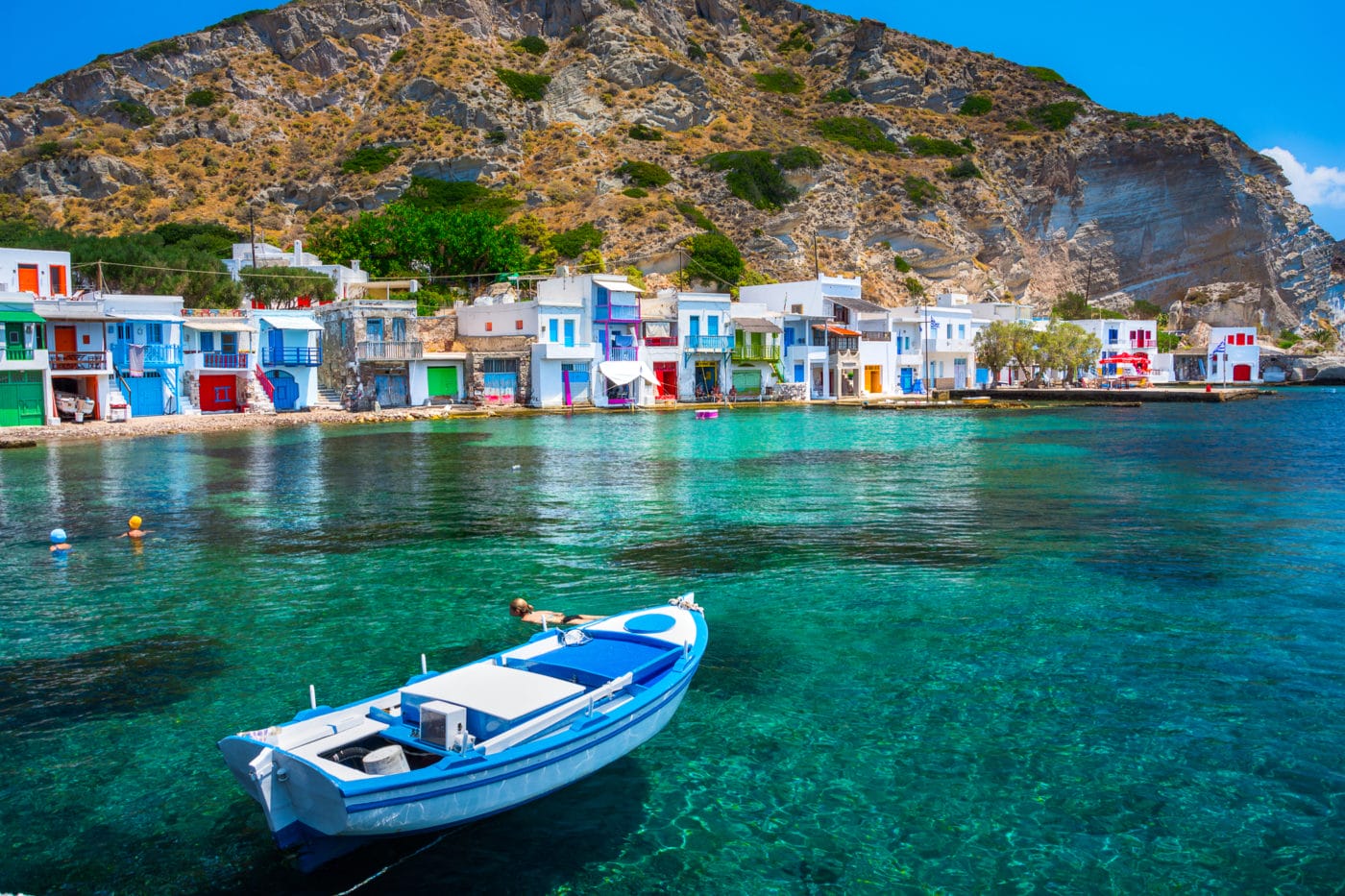
So now that you know how many days you should take into account, how are you actually going to get to the various islands and what are some things you should know before planning your Greece itinerary?
2. Don’t Reserve Back-to-Back Connecting Flights/Ferries
Since punctuality is not exactly Greece’s middle name, flights and most especially ferries can get delayed or even cancelled (and quite frequently!). Really guys, of the five ferries we took while there, only one was on time. All the others left with at least 30 minutes delay, not to mention our ferry returning to Athens, which accrued a delay of over two hours. Luckily, we didn’t book a flight out of Athens the same day as our ferry back. If we had, we would have most likely missed our return flight home.
Because of the very frequent delays (and Athens’ relentless traffic) I strongly urge you NOT to book your inbound or outbound flights to Athens the same day as your continuing flights/ferries to the islands. If you can’t stay overnight in Athens before heading out to the Greek Islands (or when coming back) I recommend scheduling AT LEAST 6 hours in between.
Island Hopping Greece – How to Travel Between the Greek Islands
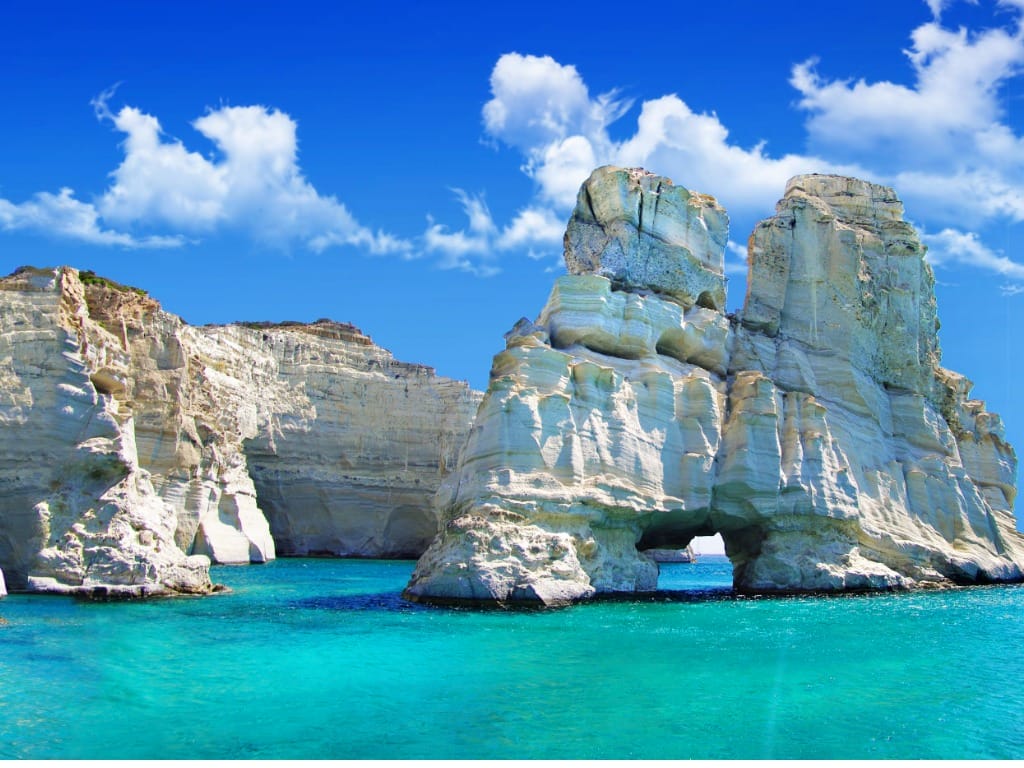
What about travelling between the Greek Islands? You can either opt to fly or take a ferry between islands. We decided to take only ferries as at the time of booking it was both the cheaper option and worked better with our schedules. Note however that only the more popular islands have airports, and some routes are not direct between the islands but connect back in Athens.
When it comes to booking ferries guys, the BEST advice I can give you is to RESERVE AHEAD OF TIME!
3. Reserve Ferry Tickets Ahead of Time
I can’t tell you how many blog posts I read that said that it was no problem to book ferry tickets right on-site. Thank god I didn’t listen and booked anyway! Why you say? There are two main reasons.
One, NOT ALL FERRIES DEPART EVERY DAY!! I cannot stress this enough. Different islands have different timetables and do not necessarily have a ferry the day you wish to leave. Some islands only have certain routes once a week (even in high season). Before you book your hotel and then realize you don’t have a ferry to get to the island with, check the ferry timetables before booking your accommodations.
Second, the ports can get reallllly crowded during high season. Having your tickets before-hand helps you skip lines AND guarantees you a seat.
*A NOTE ON FERRY RIDES: certain ferry rides might not be direct but have stops in-between!
Driving on the Greek Islands
So, what about when you actually get to the islands… what is the best mode of transportation to get around the Greek Islands?

4. Rent an ATV Instead of a Car
Getting around by ATV is no doubt the best way to explore the Greek Islands. Many beaches on the islands are accessible only via very narrow alleys or steep gravel roads where a car wouldn’t cut it.
Not only does renting a quad give you greater and easier access but it saves you parking issues as you can basically fit anywhere. (Trust me guys, trying to find a parking spot for a car in Santorini is a nightmare!)
Also, getting around the dirt roads can be so much fun on an ATV! Because some Greek islands still have uninhabited areas it can be really fun to venture around on a quad into these rugged and unexplored lands.
*CAN YOU DRIVE STICK SHIFT?* If you do need to rent a car to explore larger islands such as Crete or for mainland Greece, know that cars by default are manual in Europe. If you need an automatic car make sure you specify that when booking and also be aware that prices are more expensive for automatic cars.
What about renting a scooter/motorcycle? I do not advise renting a scooter as two wheels are just not suitable for some of the bumpy roads around the Greek Islands. We were quite the daredevils and went on some super steep paths that with a scooter would have been outright dangerous.
*CAUTION! Many roads on the islands do not have guard-rails. Paths that venture up high and remain pretty narrow can be pretty scary. Bear that in mind if you’re not a confident driver and always drive with caution.
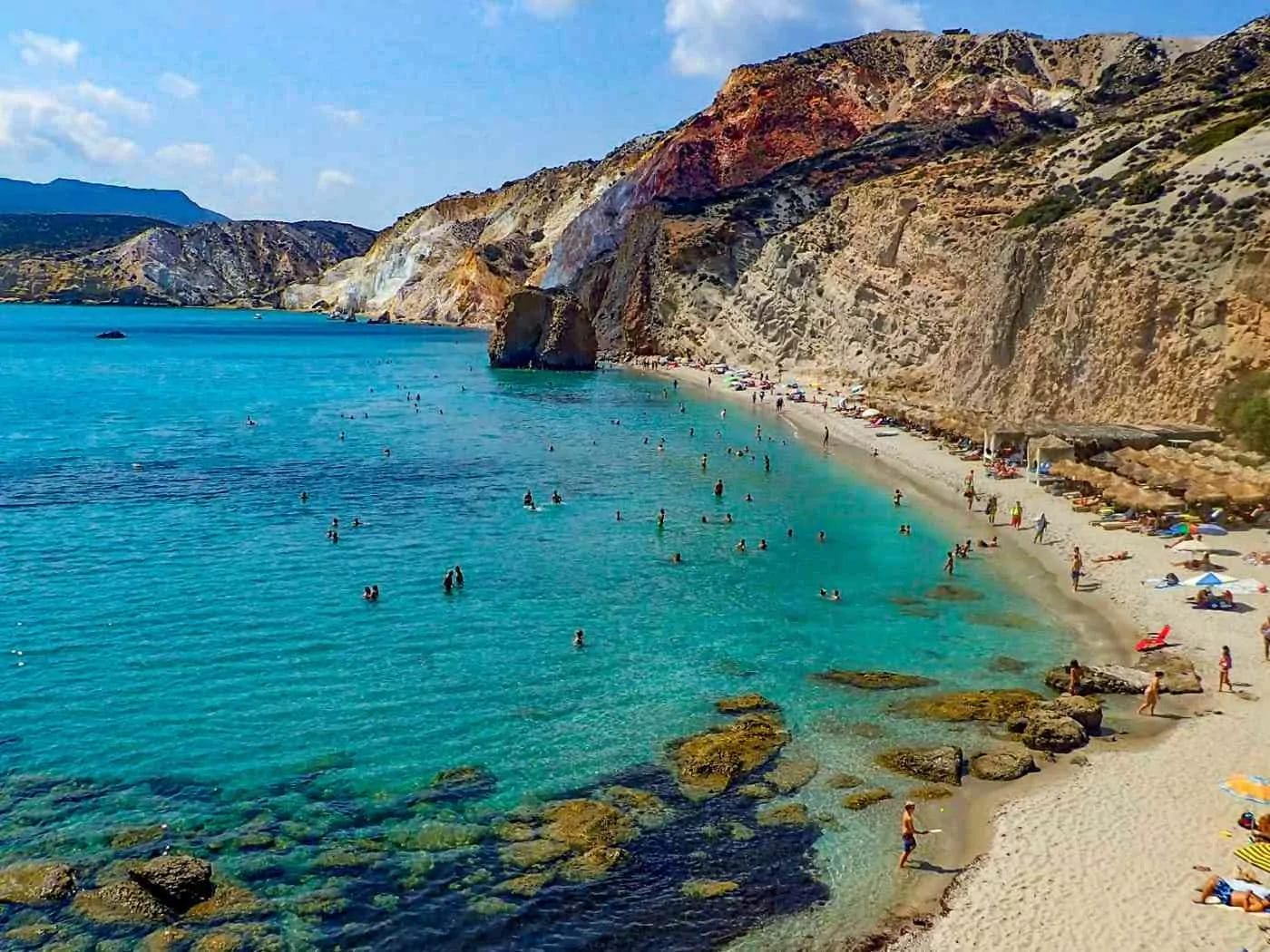
5. Do You Need to Buy Insurance for ATV Rental?
Of course, this will depend on how prone or comfortable you are with risk but in our case, we opted to not get added insurance. The people around the islands in Greece are so laid back that they themselves suggested we not purchase it.
At first, I thought this was kind of odd. But when the rental company told us that to return our ATV we could just leave the vehicle in a public parking lot with the keys on the wheel… that’s when I figured just how laid back the situation really was lol.
On another island, when I started to inspect the vehicle for prior damage, the rental guy looked at me with bewilderment and proceeded to say, “oh no! – only big boom is important in Greece!” It was too funny, and it definitely put things into a ‘Greek’ perspective.
Whatever you decide, there can always be a risk for damage. Just to be clear, we’re neither reproaching adding insurance or supporting a “no insurance policy” but just sharing our experience with ATVs on the Greek islands.
6. Choose Port Pick-Up for ATV Rentals

Even if port pick-up and drop off is on average an extra 10-euro fee, it actually still saves both time and money.
Timewise, you don’t have to figure out how to get to the rental place with public transportation (which probably would take at least 45 minutes as transportation in Greece is not the most efficient). You just get off the ferry and on to your quad and then on to your hotel – super convenient!
Moneywise, if you don’t want to wait for public transportation and opt for a taxi instead… you would definitely be paying more for the taxi ride than for the pick-up service itself.
*RENT A DOUBLE FOR 2 PPL! To save money and parking problems get a double for two people (you don’t need two singles)! You can switch drivers so you both get the experience AND you also save money.
7. Don’t Rely on Mobile Service for GPS

The days where we actually used paper maps seems to be way in the past. Well, not in Greece! In some of the more remote islands, cell phone signal is weak, and many unpaved/dirt roads are not even reported on GPS.
Having a map is super helpful when venturing off the beaten path. Ask your hotel for a map– they usually will have one that outlines even those tiny off-roads that you’ll come to see are super important.
8. Know Where the Gas Stations Are
When driving around the Greek islands it’s really important to make sure you know where your gas stations are. Although this sounds obvious, I can’t tell you how many people we found stranded and had to give a ride back to a gas station.
The reason for why running out of gas on the islands is quite common is twofold. One, gas stations are usually ONLY downtown. Thus, you might find yourself at a beach with an empty tank and no gas station close by to fuel up. Two, most people don’t factor in elevation. If you’re going to be going up to higher panorama points on the island, that burns more fuel! Keep this in mind and try to always have a full tank before starting out your day. Better safe than sorry!
What to Pack for Greece?
What about packing? Is there anything specific you should be bringing on your vacation to Greece?

9. Pack Sea Sickness Medication
First and foremost, if you’re going to be taking ferries, seriously consider bringing sea sickness medication. Even if you’re not prone to seasickness (we in fact aren’t), I guarantee that it can be an issue, especially if you opt to take high-speed ferries.
Why? High-speed ferries generally can make for a choppier ride. It’s all fine and dandy the first couple of hours, but once you hit hour number three, the nausea can really kick in.
Choose a slower ferry if you’re prone to seasickness or make sure you bring some sort of medication so that you don’t ruin the rest of your day (the patches work great).
*NOTE ON HIGH-SPEED FERRIES: High Speed ferries get canceled and delayed a lot more frequently than slower ferries. Bad weather conditions and rough waters are not suitable for high-speed ferries. Slower ferries on the other hand can generally depart even with rough waters.
10. Bring a Backpack NOT Large Hard-side Luggage

This is literally going to save you such a headache if you plan to get around by ATV. Why? Because bear in mind YOU are going to be having to carry your luggage from the port to your hotel on the back [or front] of a quad.
This means that hard-side luggage is not the best type of baggage to squeeze onto a quad. Moldable bags, or even better, backpacks… which can easily fit in the front, on the rear, or right on your shoulders are the way to go.
If you have hook cords that’s even better so you can securely fasten your baggage to the quad.
11. Bring CASH!
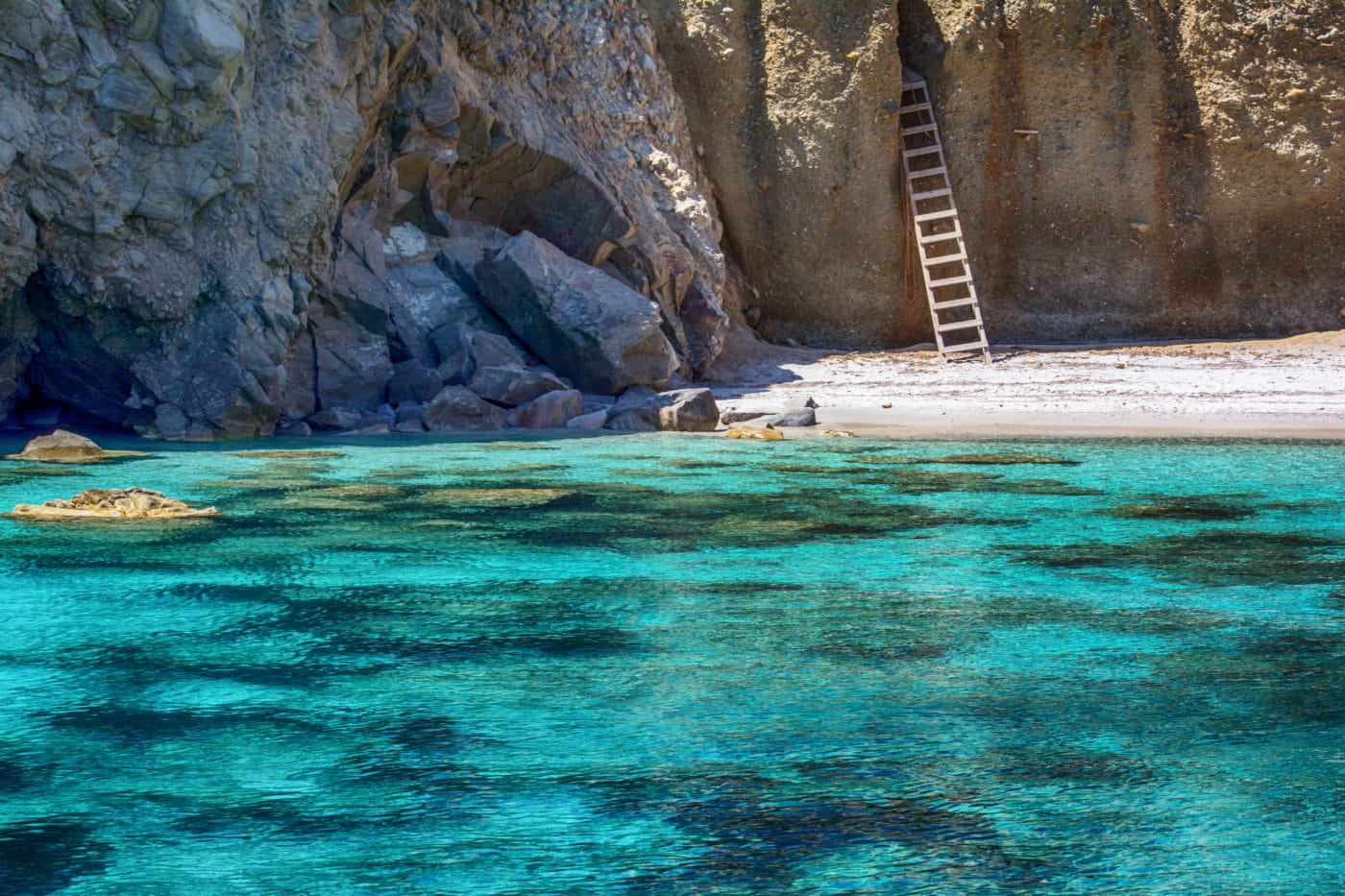
Obviously, using a credit card while traveling is the favored method of payment as it not only helps you accumulate miles and points, but it also saves you a trip to the ATM (and thus commission fees).
Unfortunately, not all places in Greece accept credit card. In fact, I would say about 50% of the places we went accepted only cash.
Because of this I would advise paying as much as you can with a credit card while always having cash on hand for when cards are not accepted.
**DOUBLE CHECK! Before traveling internationally, always remember to check with your credit card company for any commissions or foreign transaction fees that may incur.
12. Pack a Go-Pro or Underwater/Action Camera
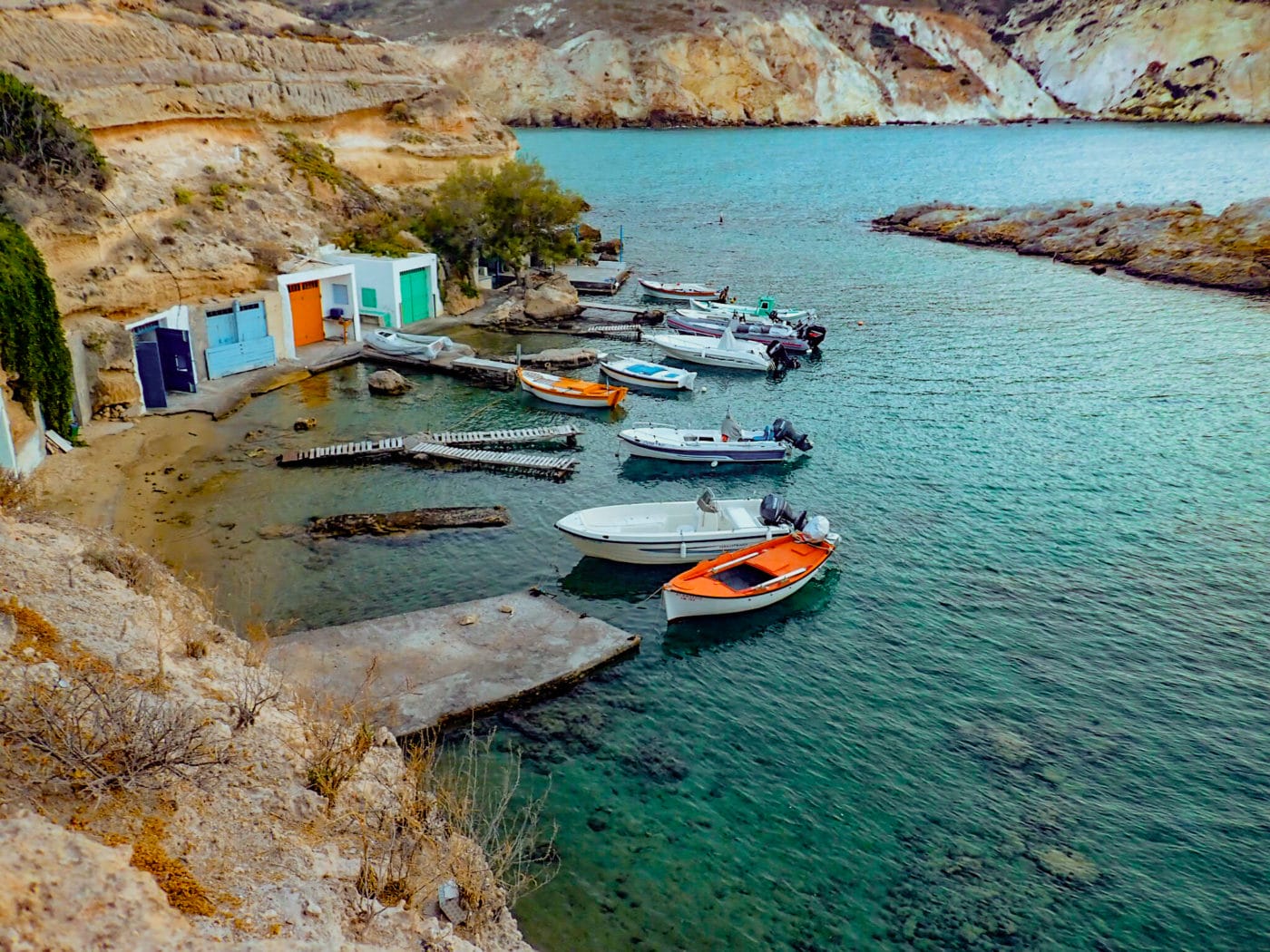
Although you might not be a photography enthusiast, you will notice very quickly that a trip to Greece entails being in the water about 80% of the time. What does that have to do with photography? Well, I guarantee you are going to want to take as many underwater shots of every little fish, plant or coral formation you come across.
The most obvious underwater camera is a Go-Pro and you can even get a dome to get those beautiful half under and half over water shots. A go-pro is also fantastic for capturing and/or vlogging your entire trip from the back of an ATV!
If you’re particularly enthusiastic, you can invest in an Insta360 camera. I just bought one (after my trip to Greece *sob*) and it is freaking amazing… the camera follows you and films with a 360-degree perspective AND has an invisible selfie stick… like what?! It is however a pricey choice.
For lower-priced products you can always opt to purchase an underwater housing case for your smartphone.
13. Pack a Waterproof Dry Bag
And while we’re on the subject of water, you might want to consider bringing a waterproof dry bag. Between boat rides, stand-up paddle, and wanting to swim out the various coves, a dry bag will allow you to bring your valuables with you and protect them from any water damage. They even float!
DO YOU NEED TO BRING SNORKELING GEAR? Absolutely not! You can rent snorkeling gear quite readily around the Greek islands- bringing your own will only make your luggage heavier.
What to Wear in Greece?
14. Invest in a Pair of Water Shoes!!
If you have to pack ONE item of clothing for your trip to Greece it is hands down WATER SHOES!
Remember, the Greek Islands have both sand and pebble beaches (don’t worry, you’ll find that pebble beaches are actually better than sand ones). So, to make the most of your experience on pebble beaches, you want to get as comfortable as you can – water shoes are the answer.
Plus, so many beaches in Greece have cliffs and grottos to explore that you honestly can’t really do barefoot – not to mention the sea urchins!
Water shoes will protect you against all of that. And get this, you can buy water shoes that are also normal shoes as well! That way you don’t have to lug them around and can just go from city to sea without a hassle. I honestly wore mine EVERYWHERE, even to dinner (*oops*!)
BEWARE** You might see some topless sunbathing – this is fairly normal along the mediterranean coast! In Greece there are also quite a few nude beaches so if you’re not keen on nudity in public you might want to double check before hitting that specific beach.
15. Don’t Pack Too Many Clothes
So, I know that while planning a trip to Greece you’re thinking of all those perfect outfits that are just so flowy and Greek you just have to pack them. I get it, TRUST ME!
But remember, you are probably going to be in a bathing suit quite literally 80% of the time. So honestly, you are not going to be needing all that much clothing.
Also, island-hopping calls for being very practical. There’s lots of heading to dinner directly from the beach or hopping on a quad for happy hour. High heels or long dresses with lots of layers are truthfully just going to be a mere hassle.
Don’t get me wrong, you can still be stylish but remember to pack practical and pack light! Go overboard on bathing suits and coverups but be reserved with clothing- trust me you’ll re-wear a lot of the garments. I traveled with just one backpack for +2 weeks (and I still could have packed way less)!
Planning a Trip to Greece – Cost of Travel

And now to more delicate matters… just how much is this trip to Greece going to weigh on your wallet?
How Much Does a Trip to Greece Cost?
Well, this will depend heavily on what accommodations you will be staying at and/or what type of style of travel you are comfortable with. Assuming a mid-range style of travel (so you are not a backpacker that stays in hostels, but you are also not looking to stay in private villas), I would say you can expect to pay a range of:
| Food, Transportation, Activities, Drinks | 100-150€ per day per person |
| Accommodation | 80-120€ per night |
To put things into perspective as to what we mean when we talk about mid-range accommodations, we stayed in a lovely double room with sea-view at Vesleme on Milos Island. The room was complete with kitchenette and even had a terrace right on the sea where we would have our breakfasts each morning. It was our own little heaven and we paid roughly 90 euro per night there.
Island Hopping in Greece on a Budget

If you’re looking however to save as much money as you can while in Greece, don’t fret… there is a way! If you keep in mind the following things while planning a trip to Greece, you’ll be sure to save a fair amount of money.
16. Travel to Less Popular Islands
Mykonos and Santorini guys are E-X-P-E-N-S-I-V-E guys.
You can literally cut your costs by 40% by just going to lesser frequented islands. And just because certain islands are less popular doesn’t mean they are less beautiful. On the contrary! I enjoyed myself much more on islands such as Milos that remain fairly untouched and authentic in comparison.
17. Eat Street Food
Don’t underestimate food costs!
When we got back from Greece, I analyzed our expenses and realized we had really gone about our food all wrong. If you’re not careful those expenses can really add up quickly.
Sure, go to a nice tavern once or twice but the great thing about Greece is that it has amazing street food! Make it your go-to meal!
18. Consider Traveling to Greece in June or September
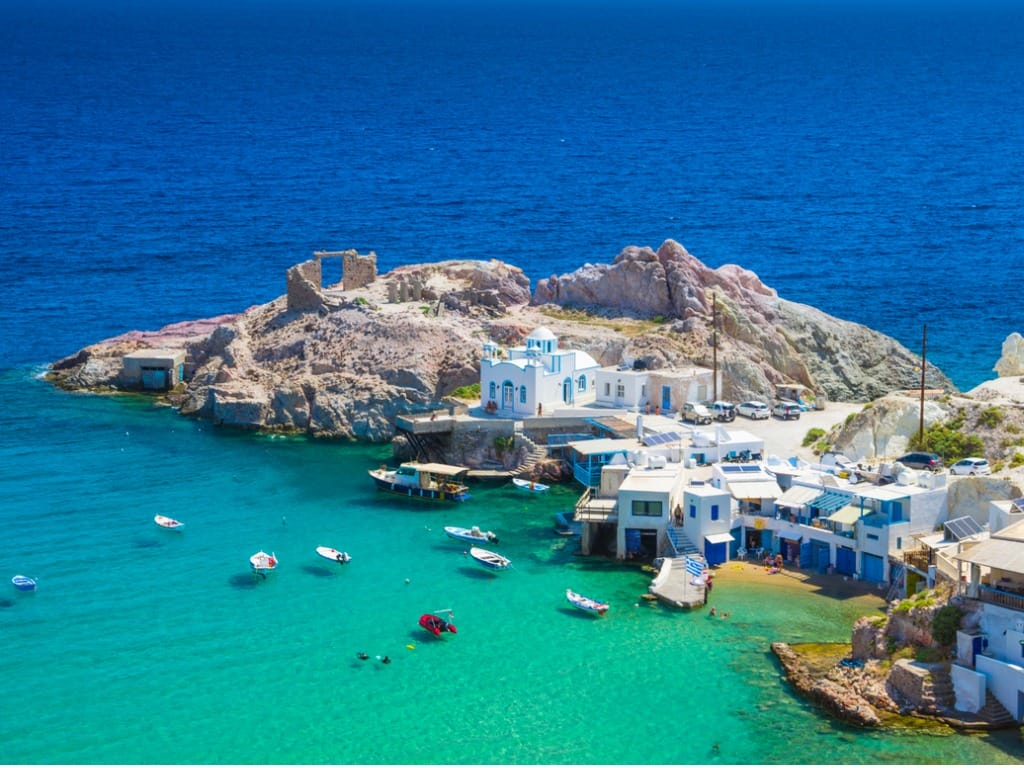
Shoulder season is a great time to visit the Greek islands not only to save money but to avoid crowds. June and September are great choices.
Make sure however to check if ferries are running and if most businesses are open. Some islands completely shut down off-season so make sure that things are running before booking that flight to Athens.
When is the Best Time to Visit Greece?
As just mentioned, shoulder season is the best time to visit Greece. This means May/June or September/October. Personally, I would say the best month to visit is September as crowds have died down, prices are lower, and the water is still warm to swim. (May and June can still have colder waters).
Planning a Trip to Greece Final Tips
So, there it is ladies… my top 18 tips for planning a trip to Greece. I honestly think that these essential things to know before traveling to Greece will help you prepare for the vacation of a lifetime.
I hope to get back to Greece soon and explore a couple other islands! Until then please feel free to comment below with any Greece travel tips or ANY suggestions or questions you may have when planning a Greece vacation!
Don’t forget to follow along on my adventures at @ladolcefitvita…
Yia Mas!
Other Blog Posts You May Like:
This blog post is intended for general informational and educational purposes only. Please read my full disclosure for further information.
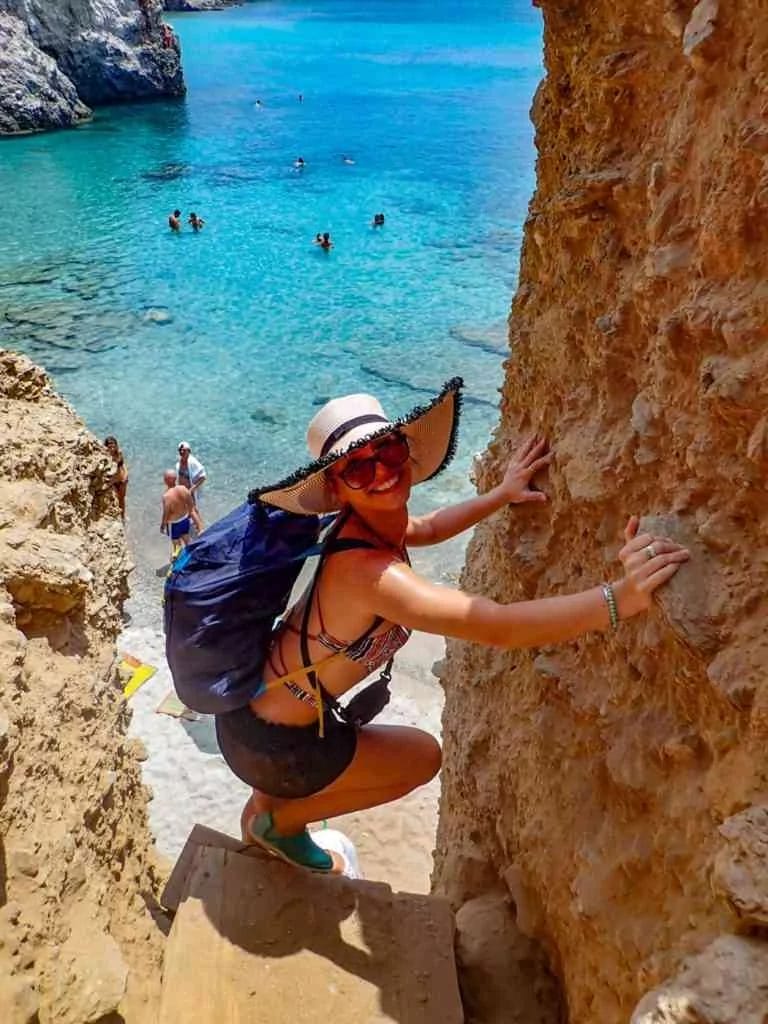

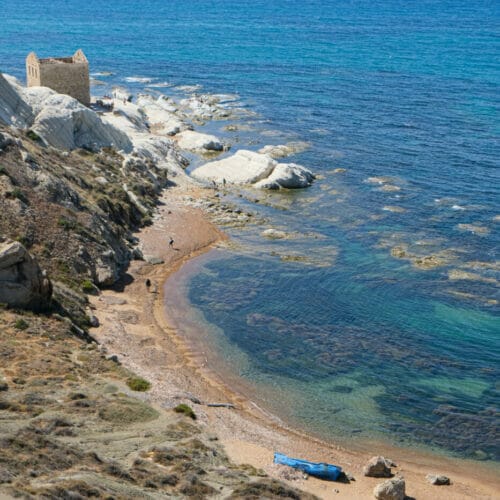

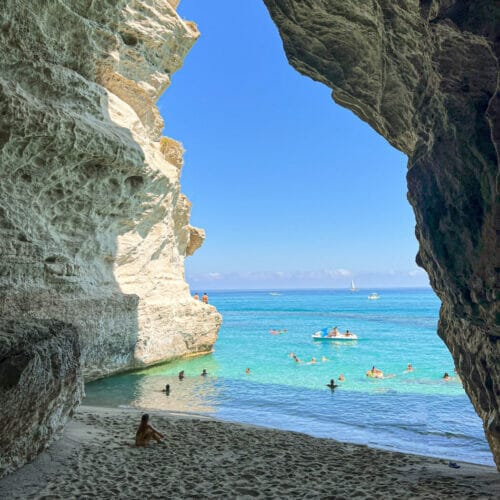
Emma Hoyes says
Great post and really helpful tips. A few had me nodding like phew I’ve done that. A few I need to look into! Haha. So excited to island hop!
Linda Faison says
Great this makes me so happy that you found it helpful! Have fun island-hopping!!